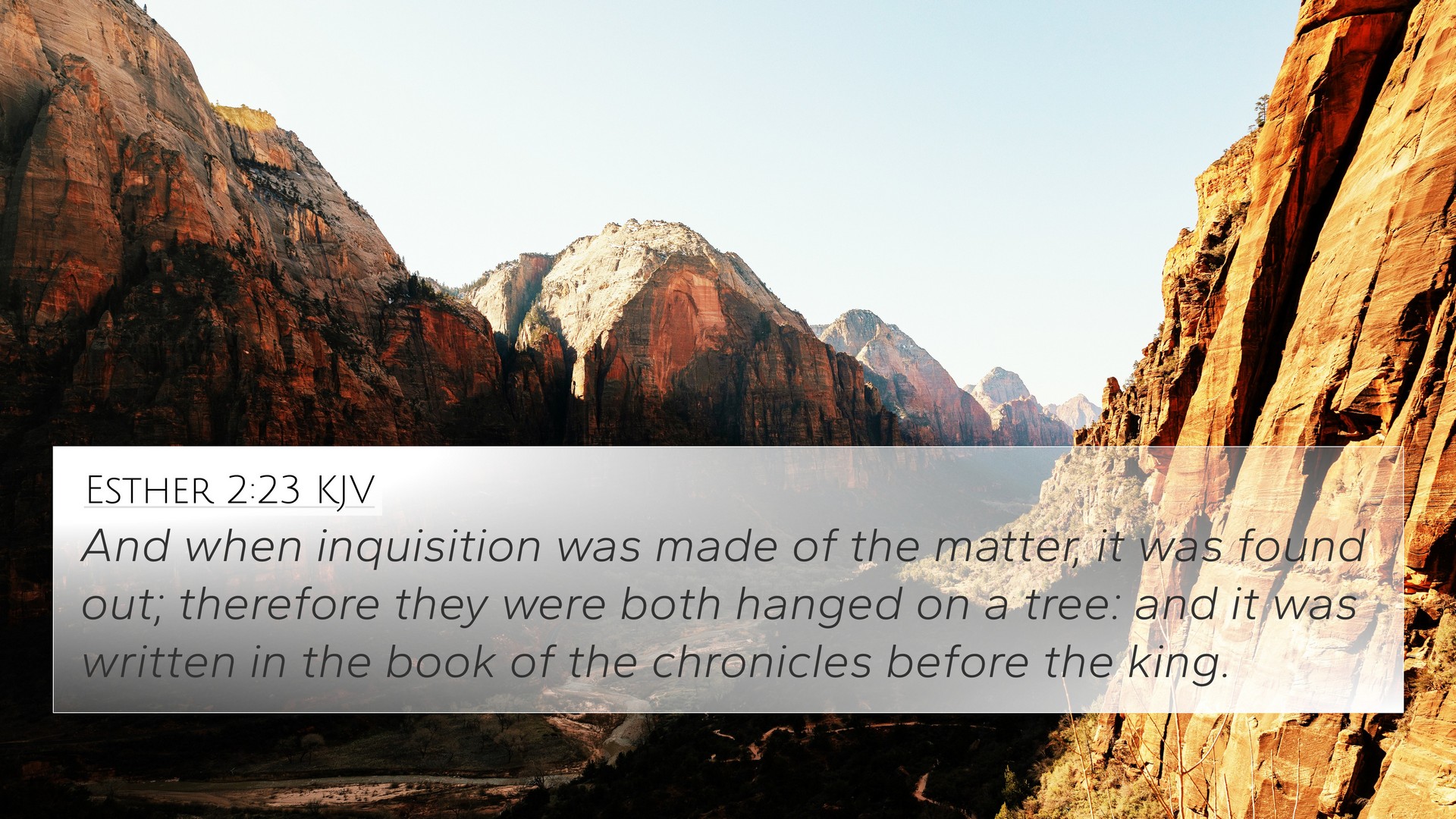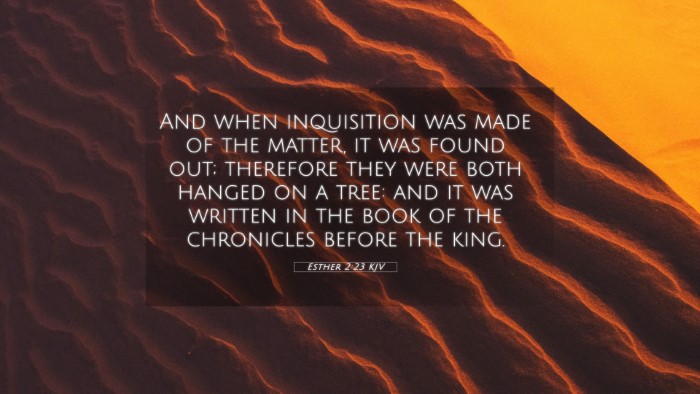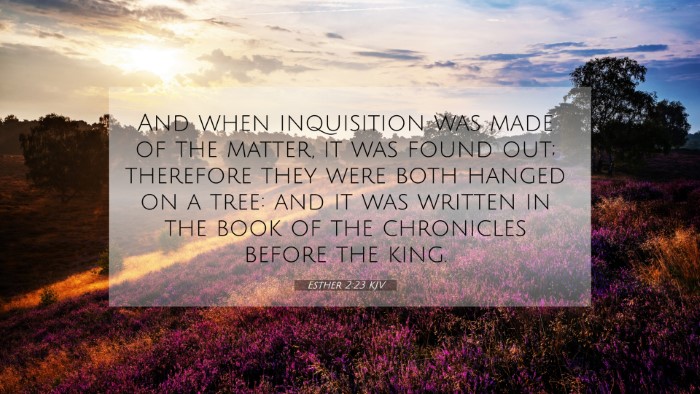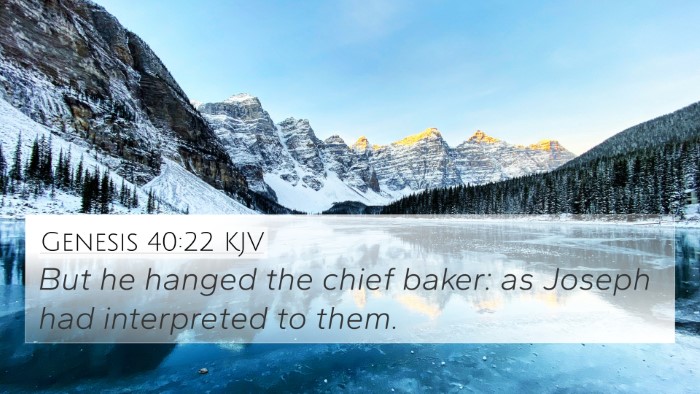Old Testament
Genesis Exodus Leviticus Numbers Deuteronomy Joshua Judges Ruth 1 Samuel 2 Samuel 1 Kings 2 Kings 1 Chronicles 2 Chronicles Ezra Nehemiah Esther Job Psalms Proverbs Ecclesiastes Song of Solomon Isaiah Jeremiah Lamentations Ezekiel Daniel Hosea Joel Amos Obadiah Jonah Micah Nahum Habakkuk Zephaniah Haggai Zechariah MalachiEsther 2:23 Similar Verses
Esther 2:23 Cross References
And when inquisition was made of the matter, it was found out; therefore they were both hanged on a tree: and it was written in the book of the chronicles before the king.
Uncover the Rich Themes and Topics of This Bible Verse
Listed below are the Bible themes associated with Esther 2:23. We invite you to explore each theme to gain deeper insights into the Scriptures.
Esther 2:23 Cross Reference Verses
This section features a detailed cross-reference designed to enrich your understanding of the Scriptures. Below, you will find carefully selected verses that echo the themes and teachings related to Esther 2:23 KJV. Click on any image to explore detailed analyses of related Bible verses and uncover deeper theological insights.
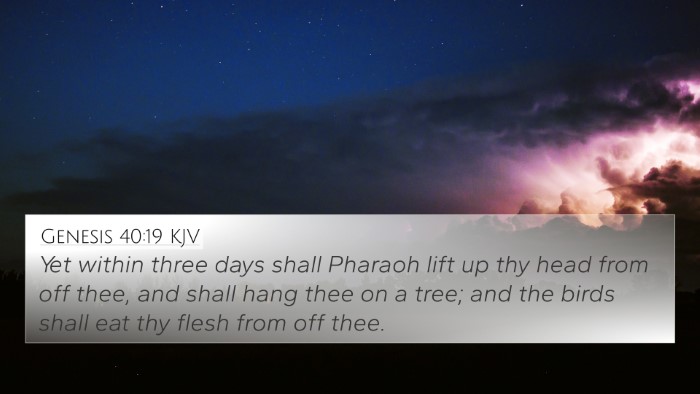
Genesis 40:19 (KJV) »
Yet within three days shall Pharaoh lift up thy head from off thee, and shall hang thee on a tree; and the birds shall eat thy flesh from off thee.
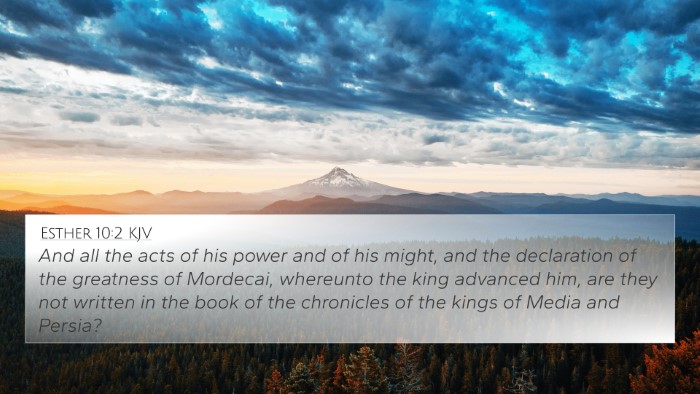
Esther 10:2 (KJV) »
And all the acts of his power and of his might, and the declaration of the greatness of Mordecai, whereunto the king advanced him, are they not written in the book of the chronicles of the kings of Media and Persia?
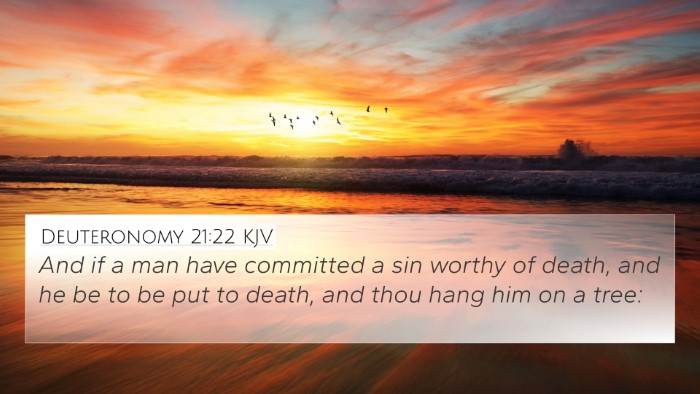
Deuteronomy 21:22 (KJV) »
And if a man have committed a sin worthy of death, and he be to be put to death, and thou hang him on a tree:
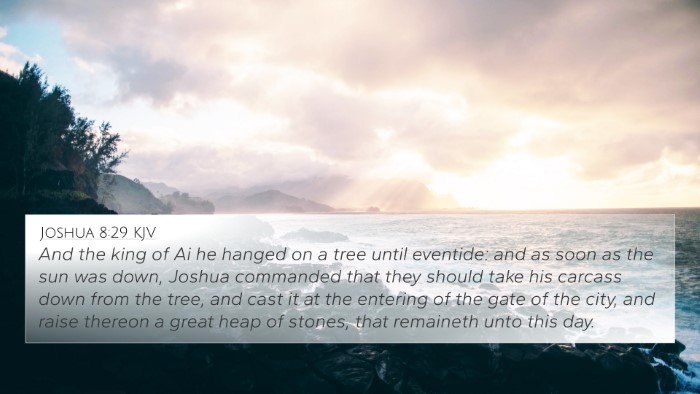
Joshua 8:29 (KJV) »
And the king of Ai he hanged on a tree until eventide: and as soon as the sun was down, Joshua commanded that they should take his carcass down from the tree, and cast it at the entering of the gate of the city, and raise thereon a great heap of stones, that remaineth unto this day.
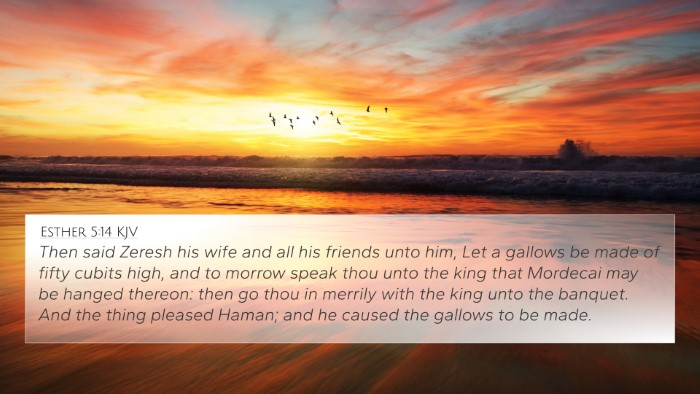
Esther 5:14 (KJV) »
Then said Zeresh his wife and all his friends unto him, Let a gallows be made of fifty cubits high, and to morrow speak thou unto the king that Mordecai may be hanged thereon: then go thou in merrily with the king unto the banquet. And the thing pleased Haman; and he caused the gallows to be made.
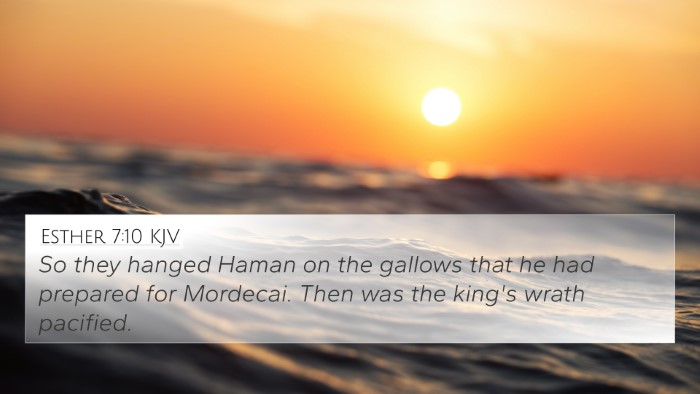
Esther 7:10 (KJV) »
So they hanged Haman on the gallows that he had prepared for Mordecai. Then was the king's wrath pacified.
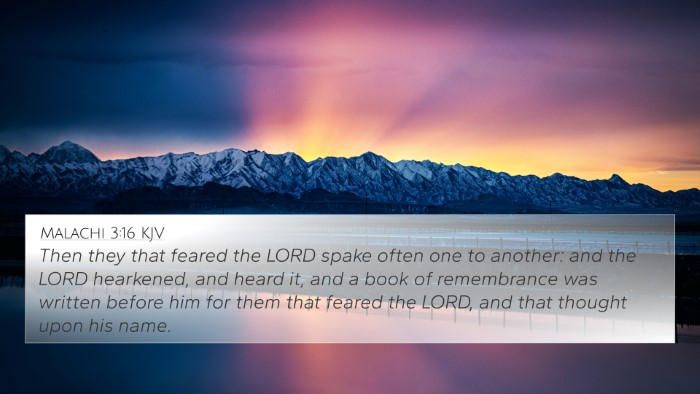
Malachi 3:16 (KJV) »
Then they that feared the LORD spake often one to another: and the LORD hearkened, and heard it, and a book of remembrance was written before him for them that feared the LORD, and that thought upon his name.
Esther 2:23 Verse Analysis and Similar Verses
Understanding Esther 2:23
Esther 2:23 states: "And when the matter was known, it was written in the book of the chronicles before the king." This verse captures a pivotal moment in the narrative of Esther that showcases the themes of justice, providence, and divine timing.
Summary of Esther 2:23
This verse highlights the significance of recording events in the chronicles of the king, emphasizing the importance of memory and justice in the governance of the Persian Empire. Here are some combined insights from public domain commentaries:
-
Matthew Henry:
Henry highlights that this recording serves as a reminder of Mordecai’s loyalty and the subsequent justice that will play a role later in the narrative. The chronicling signifies that no good deed is overlooked by God and points toward the eventual reward for Mordecai.
-
Albert Barnes:
Barnes notes that the act of recording this event foreshadows the later exaltation of Mordecai, illustrating God's providence in seemingly trivial matters. Such chronicles were common in Persian literature, and this indicates a system of governance that values loyalty and justice.
-
Adam Clarke:
Clarke emphasizes the moral lesson of the verse, indicating that God uses even small acts of justice to fulfill His larger plans. The record of Mordecai's deed is pivotal for future events, showcasing that all actions, like Mordecai's, are part of a divine timeline.
Thematic Connections
Esther 2:23 leads to several thematic connections within the Bible:
- Divine Providence: The recording of deeds aligns with the understanding of God's sovereignty and providence in the unfolding of events throughout Scripture.
- Justice and Loyalty: The verse reflects on themes of justice and the importance of loyalty, linking back to other scriptures discussing righteousness and integrity.
- Faithfulness Rewarded: Highlights the concept of faithfulness being rewarded, seen in parallels such as Luke 19:11-27.
- Historical Chronicles: This connects to other historical accounts in the Bible, especially the books of Chronicles which document the history and fidelity of Israel.
Bible Cross-References
Here are several Bible cross-references that relate to Esther 2:23:
- Proverbs 10:7: "The name of the righteous is used in blessings, but the name of the wicked will rot." - Emphasizes the lasting impact of good deeds.
- Psalm 56:8: "Record my misery; list my tears on your scroll—are they not in your record?" - The theme of divine record-keeping.
- Matthew 25:21: "His master replied, 'Well done, good and faithful servant!'" - Illustrates the reward for loyalty.
- 1 Samuel 2:30: "...for those who honor me I will honor..." - Highlights that God honors those who remain faithful.
- Hebrews 6:10: "God is not unjust; he will not forget your work and the love you have shown him..." - Assurance that God remembers our deeds.
- Galatians 6:7: "A man reaps what he sows." - Reinforces the principle of divine justice.
- Revelation 20:12: "And I saw the dead, great and small, standing before the throne, and books were opened." - Echoes the concept of judgment based on recorded deeds.
Conclusion
Esther 2:23 serves as a crucial reminder that even the smallest acts of faithfulness and loyalty are not unnoticed in God's divine plan. This verse invites readers to reflect on the great themes of God's sovereignty, the importance of justice, and the intertwining of human actions with God's overarching narrative. Through the thematic connections and cross-references, we see how Esther's story intertwines with the broader fabric of scripture, providing valuable lessons on faithfulness and the assurance that God will honor those who act in righteousness.
Tools for Bible Cross-Referencing
For those studying the Bible, various tools can help with cross-referencing:
- Bible concordance
- Bible cross-reference guide
- Cross-reference Bible study tools
- Bible reference resources
- Comprehensive Bible cross-reference materials
